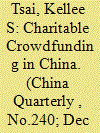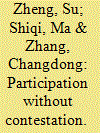|
|
|
Sort Order |
|
|
|
Items / Page
|
|
|
|
|
|
|
| Srl | Item |
| 1 |
ID:
169792


|
|
|
|
|
| Summary/Abstract |
Social media in China has not only become a popular means of communication, but also expanded the interaction between the government and online citizens. Why have some charitable crowdfunding campaigns had agenda-setting influence on public policy, while others have had limited or no impact? Based on an original database of 188 charitable crowdfunding projects currently active on Sina Weibo, we observe that over 80 per cent of long-term campaigns do not have explicit policy aspirations. Among those pursuing policy objectives, however, nearly two-thirds have had either agenda-setting influence or contributed to policy change. Such campaigns complement, rather than challenge existing government priorities. Based on field interviews (listed in Appendix A), case studies of four micro-charities – Free Lunch for Children, Love Save Pneumoconiosis, Support Relief of Rare Diseases, and Water Safety Program of China – are presented to highlight factors that contributed to their variation in public outcomes at the national level. The study suggests that charitable crowdfunding may be viewed as an “input institution” in the context of responsive authoritarianism in China, albeit within closely monitored parameters.
|
|
|
|
|
|
|
|
|
|
|
|
|
|
|
|
| 2 |
ID:
186947


|
|
|
|
|
| Summary/Abstract |
How do non-governmental organizations (NGOs) advocate public policies? What impacts their advocacy strategies? Although scholars have addressed these questions in a democratic context, less is known about NGO advocacy under powerful authoritarian regimes. Using China as a case study, we develop an institutional explanation of NGOs’ policy advocacy patterns and explore the impacts of NGO autonomy. Using a unique dataset of registered NGOs in three Chinese provinces, we find that NGOs with more autonomy tend to conduct direct negotiations with the government more actively (more political advocacy). However, these more autonomous NGOs are likely to be more hesitant to mobilize society from the bottom up (less social advocacy). These findings enrich our knowledge of social actors’ roles in the policymaking process in China.
|
|
|
|
|
|
|
|
|
|
|
|
|
|
|
|
| 3 |
ID:
165958


|
|
|
|
|
| Summary/Abstract |
Over the past decade, several environmental protests against hazardous projects have been mounted across China. Though extensive scholarship has been devoted to the outcomes of environmental contention, a significant distinction between local government's one-off decision change regarding the specific project and long-term, locked-in policy change towards better governance has largely been overlooked. Meanwhile, environmental contention in authoritarian China has largely been studied in terms of disparate episodes, making systematic observation and effective comparison difficult. Using crisp-set qualitative comparative analysis (csQCA), this article investigates the effect of social contention on shaping environmental governance, analysing 20 influential cases of environmental protests in China from 2007 to 2014. It demonstrates that environmental contention efforts often yield different fruits in their “project battles” than in their “policy wars.” Moreover, this study argues that environmental protests necessitate ample effort of public policy from a variety of social agents with multifaceted mechanisms and strategies, highlighting the significance of the protest–advocacy linkage in extracting better governance from local states in authoritarian settings.
|
|
|
|
|
|
|
|
|
|
|
|
|
|
|
|
| 4 |
ID:
181850


|
|
|
|
|
| Summary/Abstract |
Do Chinese nongovernmental organizations (NGOs) conduct policy advocacy? If so, how are they shaped by the state power? Following the Tocquevillian perspective of the state, we use an institutional analytical framework and disaggregate China's political institutions into three levels. We then investigate how Chinese NGOs' advocacy strategies are shaped and constrained at each level. Using the survey data from three provinces, we find that Chinese NGOs prefer political advocacy to social advocacy, though both are limited. They target government branches and advocate policies through supervisory units more frequently than the legislature or judiciary. We also find that NGOs' operational organizational autonomy is negatively associated with the likelihood that NGOs would engage in all types of advocacy channels. These findings suggest that, on one hand, state power substantially shapes NGOs' policy advocacy channels. On the other hand, NGOs' policy advocacy strengthens state capacity without reducing state autonomy.
|
|
|
|
|
|
|
|
|
|
|
|
|
|
|
|
|
|
|
|
|